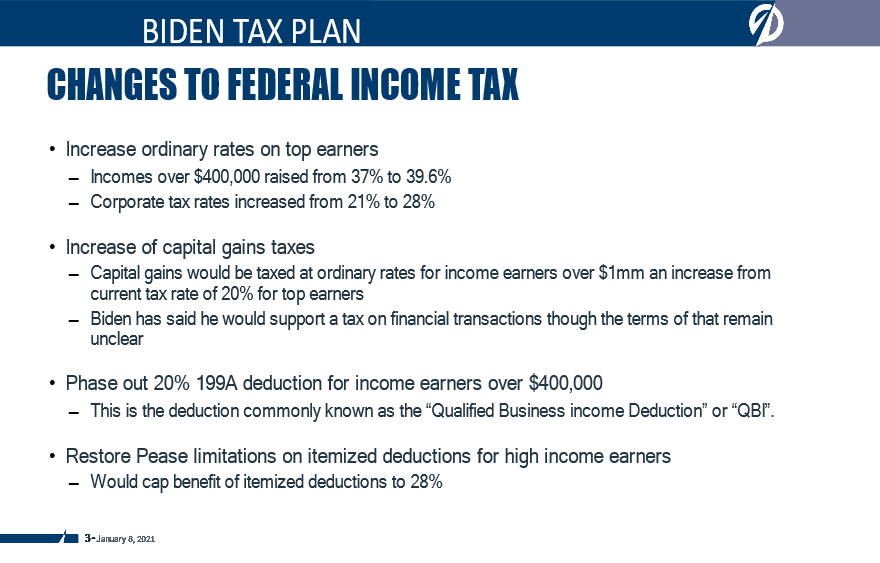Key Take Aways from Chicago’s January Mastermind Group Meeting!
- The Biden plan will impact three key areas: Federal Income Taxes, Social Security/Employment taxes, and Estate Taxes.
- We will need a lot of tax planning to stay under the numerous thresholds.
- Maximizing the losses from real estate will be much more important every single year going forward.
- The capital gains tax is changing so many fund managers are locked into what the fund intentions were in the past however, we could see modifications to current investment models to extend the recognition of the capital gain; too early to really confirm but certainly could be a trend.
- Biden’s proposal includes a 12.4% social security tax on incomes earned over $400,000 (currently social security is only taxed on the first $137,700 of wages). And, self-employment tax would also be subject to the same 12.4% over $400,000. The numbers could get big which would be a major deviation of the current plan and the fundamental idea of what social security is as a whole.
- Any changes to the tax bill is a wait and see at this point; hopefully, they will not be too radical.
- When changes in the tax bill go into place, there is usually a precedent for some things to be retroactive but highly unlikely for some of these major changes and most changes won’t occur until January 1, 2022.
- Changes to the estate tax would reduce the lifetime exemptions and gift tax limits to “historical norms”; as a result there could be some forced sales on estate taxes.
- Eliminate the step up in basis for inherited assets however, it is unclear how this would be implemented.
- Most funds have a timeline and it is difficult to alter those timelines to avoid higher levels and to avoid capital gains taxes. One consideration is to change the basic investment strategy to a long-term holding so as not to recognize the gains.
- Timing of deal flow will be critical at the end of the year to generate enough losses in the same year to shelter that income.
- There will likely be more deals in a distressed situation and (for now) there shouldn’t be any negative impact on 1031s since it is such an important part of the real estate industry (Ian Grusd, Ten-X Commercial Real Estate)
- The amount of re-education the new administration will require (especially in the multi-family market) is huge. So many unknowns and the changes effect more than just taxes and financing. (Brooke Jackson, Newmark)
- The tax cuts and job acts was a huge change since 1986. These proposed changes could be huge and the onboarding and learning is challenging – especially for the estate people. Hopefully, it won’t change every four years. (Patrick Olerich, CohnReznick)
- The tax changes will 100% impact investors and real estate. 1031’s will also be impacted because their purpose is 100% tax focused as well as the capital gains. (Wesley Prato, CohnReznick)
- Companies like Bender Companies are net buyers and are receiving some fees but for the most part are in a position where they are buying vs. selling so enjoying the low interest rates.
- The changes may not have a big impact for them currently as they are in a heavy growth mode. (Mark Barnes, Bender Companies)
- Some of these radical changes could happen and as we move forward in the coming months, then people are going to have to be more reactionary so need to get ahead of the situation now. (Patrick Olerich, CohnReznick)






Recent Comments